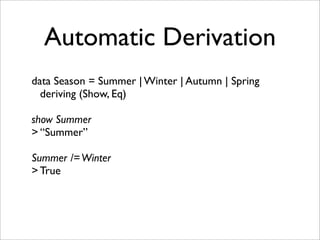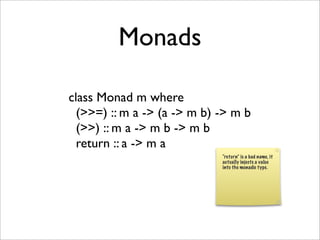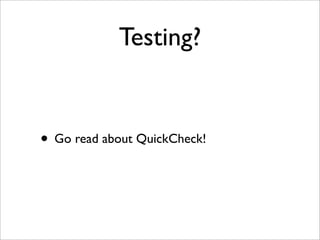Functional Programming and Haskell - TWBR Away Day 2011
- 2. Why FP? • Source of new ideas • Expressiveness • Multi-core CPUs • Different paradigm New ideas: Garbage collection (LISP) Type inference (simply typed lambda calculus) Generics Type classes Expressiveness: DSLs
- 3. What is it? • Different programming paradigm • OO • Logic • Procedural • Functions are the main element in the language
- 4. Function applications “Functional programming is so called because a program consists entirely of functions. [...] Typically the main function is defined in terms of other functions, which in turn are defined in terms of still more functions, until at the bottom level the functions are language primitives.” John Hughes, 1989 -Why functional programming matters
- 5. Origin Alonzo Church developed Lambda Calculus as part of his investigations on Math foundations on 1936.
- 6. Lambda Calculus • Variables • Expressions (e1 e2) • Lambda abstractions (λx. e)
- 7. Lambda Calculus (I) • true = λxy. x • false = λxy. y • NOT a = (a)(false)(true) • a AND b = (a)(b)(false) • a OR b = (a)(true)(b) • a XOR b = (a)((b)(false)(true))(b)
- 8. Haskell • Academic origin • Named in honor of Haskell Curry • Defined by a committee • First version released on 98 (Haskell 98)
- 9. Features • Pureness • Type Inference • Algebraic datatypes (ADTs) • Pattern Matching • Lazyness • High Order Functions • Currification (aka Partial Application) • Type Classes • Monads
- 10. Pureness • No side-effects • A function call can have no effect other than to compute its result • Expressions can be evaluated at any time • Programs are “referentially transparent” Good for: * reasoning * compiler optimization * concurrency
- 11. Type Inference Let’s see the types for these declarations: four = 4 add x y = x + y emphasize x = x ++ “!”
- 12. Algebraic datatypes Enumeration: data Season = Summer | Winter | Autumn | Spring Product: data Pair = Pair Int Int Sum: data Shape = Circle Float | Rect Float Float Polymorfic & Recursive: data Tree a = Leaf a | Node (Tree a) (Tree a)
- 13. Algebraic datatypes (I) data Maybe a = Nothing | Just a data Either a b = Left a | Right b
- 14. Pattern Matching Definition: sum [] = 0 sum (elem:rest) = elem + sum rest Application: sum [1,2,3,10]
- 15. Pattern Matching (I) area (Circle rad) = pi * rad ^ 2 area (Rect width height) = width * height first (Pair value _) = value
- 16. High Order Functions Functions which at least: • Receive functions as parameters • Return functions (aka curried functions)
- 17. High Order Functions (I) map :: (a -> b) -> [a] -> [b] map f [] = [] map f (x:xs) = f x : map f xs
- 18. Currification add :: Int -> Int -> Int add x y = x + y inc :: Int -> Int inc = add 1
- 19. Lazyness • aka “call by need” • Expressions can be evaluated when necessary • Allows the use of infinite lists Being pure helps here
- 20. Lazyness (I) Definition: even_numbers :: [Int] even_numbers = filter even [1..] Application: take 5 even_numbers
- 21. Lazyness (II) fibs :: [Int] fibs = 0 : 1 : zipWith (+) fibs (tail fibs) From: http://en.wikipedia.org/wiki/Lazy_evaluation
- 22. Type Classes • Created to solve the problem with numeric operator overload and equality testing • Some type classes defined by Haskell 98: • Eq • Read/Show
- 23. Type Classes (I) class Eq a where (==), (/=) :: a -> a -> Bool x == y = not (x /= y) x /= y = not (x == y) You can define what is called a “minimal implementation”.
- 24. Type Classes (II) data User = User { name :: String } instance Eq User where user1 == user2 = name user1 == name user2 instance Show User where show user = name user
- 25. Automatic Derivation data Season = Summer | Winter | Autumn | Spring deriving (Show, Eq) show Summer > “Summer” Summer /=Winter > True
- 26. Monads • Adds to the type system a way to describe actions • The actions will happen in a certain order
- 27. Monads • Common monads: • IO • State • Reader • Maybe
- 28. Monads thing1 >>= x -> func1 x >>= y -> thing2 >>= _ -> func2 y >>= z -> return z do x <- thing1 y <- func1 x thing2 z <- func2 y return z sugar no-sugar
- 29. Monads class Monad m where (>>=) :: m a -> (a -> m b) -> m b (>>) :: m a -> m b -> m b return :: a -> m a “return” is a bad name, it actually injects a value into the monadic type.
- 30. Logger Monad type Log = [String] data Logger resultType = Logger (resultType, Log) deriving Show record x = Logger ((), [x]) instance Monad Logger where return value = Logger (value, []) prevLogger >>= nextAction = let Logger (prevResult, prevLog) = prevLogger Logger (newResult, newLog) = nextAction prevResult in Logger (newResult, prevLog ++ newLog)
- 31. Testing? • Go read about QuickCheck!
- 32. Want to learn more? Freely available online: http://book.realworldhaskell.org/
- 33. Your Knowledge Portfolio "Learn at least one new language every year. [...] Different languages solve the same problems in different ways. By learning several different approaches, you can help broaden your thinking and avoid getting stuck in a rut." The Pragmatic Programmer




![Function applications
“Functional programming is so called because a
program consists entirely of functions. [...]
Typically the main function is defined in terms of other
functions, which in turn are defined in terms of still
more functions, until at the bottom level the functions
are language primitives.”
John Hughes, 1989 -Why functional programming matters](https://image.slidesharecdn.com/functionalprogrammingandhaskell-awayday-130705135420-phpapp02/85/Functional-Programming-and-Haskell-TWBR-Away-Day-2011-4-320.jpg)









![Pattern Matching
Definition:
sum [] = 0
sum (elem:rest) = elem + sum rest
Application:
sum [1,2,3,10]](https://image.slidesharecdn.com/functionalprogrammingandhaskell-awayday-130705135420-phpapp02/85/Functional-Programming-and-Haskell-TWBR-Away-Day-2011-14-320.jpg)


![High Order Functions (I)
map :: (a -> b) -> [a] -> [b]
map f [] = []
map f (x:xs) = f x : map f xs](https://image.slidesharecdn.com/functionalprogrammingandhaskell-awayday-130705135420-phpapp02/85/Functional-Programming-and-Haskell-TWBR-Away-Day-2011-17-320.jpg)


![Lazyness (I)
Definition:
even_numbers :: [Int]
even_numbers = filter even [1..]
Application:
take 5 even_numbers](https://image.slidesharecdn.com/functionalprogrammingandhaskell-awayday-130705135420-phpapp02/85/Functional-Programming-and-Haskell-TWBR-Away-Day-2011-20-320.jpg)
![Lazyness (II)
fibs :: [Int]
fibs = 0 : 1 : zipWith (+) fibs (tail fibs)
From: http://en.wikipedia.org/wiki/Lazy_evaluation](https://image.slidesharecdn.com/functionalprogrammingandhaskell-awayday-130705135420-phpapp02/85/Functional-Programming-and-Haskell-TWBR-Away-Day-2011-21-320.jpg)








![Logger Monad
type Log = [String]
data Logger resultType = Logger (resultType, Log)
deriving Show
record x = Logger ((), [x])
instance Monad Logger where
return value = Logger (value, [])
prevLogger >>= nextAction =
let Logger (prevResult, prevLog) = prevLogger
Logger (newResult, newLog) = nextAction prevResult
in Logger (newResult, prevLog ++ newLog)](https://image.slidesharecdn.com/functionalprogrammingandhaskell-awayday-130705135420-phpapp02/85/Functional-Programming-and-Haskell-TWBR-Away-Day-2011-30-320.jpg)


![Your Knowledge Portfolio
"Learn at least one new language every year.
[...] Different languages solve the same
problems in different ways. By learning several
different approaches, you can help broaden
your thinking and avoid getting stuck in a
rut."
The Pragmatic Programmer](https://image.slidesharecdn.com/functionalprogrammingandhaskell-awayday-130705135420-phpapp02/85/Functional-Programming-and-Haskell-TWBR-Away-Day-2011-33-320.jpg)
